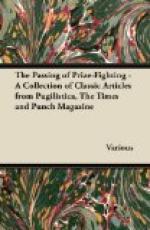* * * * *
PARS ABOUT PICTURES.—There is always something fresh coming out at Messrs. DOWDESWELL’s Articultural Garden in Bond Street. Their latest novelty is the result of a caravan tour from Dieppe to Nice ("Dieppend upon it, he found it very nice!” said Young PAR, regardless of propriety and pronunciation) by Mr. C.P. SAINTON. CHARLES COLLINS utilised such an expedition from a literary point of view in his inimitable “Cruise upon Wheels,” and this young artist has turned similar wanderings to good artistic account. His cartes de visite—no, I beg pardon, his caravans de visite—are numerous and varied. Verily, my brethren, all is caravanity! Not altogether, for Mr. SAINTON, in addition to returning with his caravan and himself, has brought back an interesting collection of original and delicate works in oil and silver-point—in short, taken every caravantage of his special opportunities. Yours parlously, OLD PAR.
* * * * *
“MAY IT PLEASE YOUR ‘WARSHIPS.’”—Twenty-three American ships, 118 guns, and 3,000 men; six British ships, 52 guns, 1,229 men; and seven German ships, 42 guns, and 1,500 men—all in “Pacific” waters! Looks like Pacific, doesn’t it?
* * * * *
MR. PUNCH’S PRIZE NOVELS.
NO. XI.—THE BOOK OF KOOKARIE.
BY READER FAGHARD, AUTHOR OF “QUEEN BATHSHEBA’S EWERS,” “YAWN,” “GUESS,” “ME,” “MY MA’S AT PENGE,” “SMALLUN HALFBOY,” “GENERAL PORRIDGE, D.T.,” “ME A KISS,” “THE HEMISPHERE’S WISH,” &C., &C.
[In a long communication which accompanied the MS. of this novel, the Author gives a description of his literary method. We have only room for a few extracts. “I have been accused of plagiarism. I reply that the accusation is ridiculous. Nature is the great plagiarist, the sucker of the brains of authors. There is no situation, however romantic or grotesque, which Nature does not sooner or later appropriate. Therefore the more natural an author is, the more liable is he to envious accusations of plagiarism.... Humour may often be detected in an absence of leg-coverings. A naval officer is an essentially humorous object.... As to literary style, it can be varied at pleasure, but the romantic Egyptian and the plain South African are perhaps best. In future my motto will be, ’Ars Langa Rider brevis,’ and a very good motto too. I like writing in couples. Personally I could never have bothered myself to learn up all these quaint myths and literary fairy tales, but LANG likes it.”]




